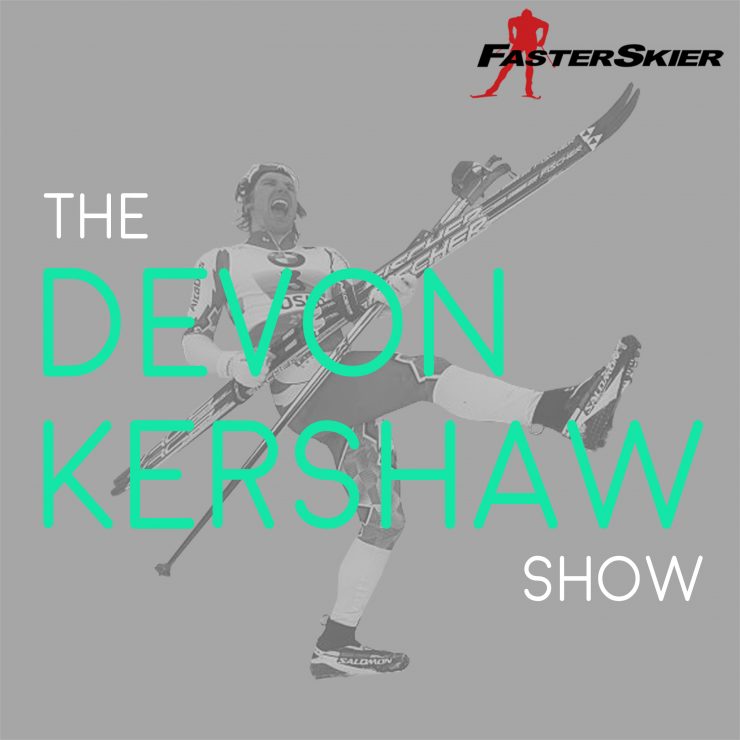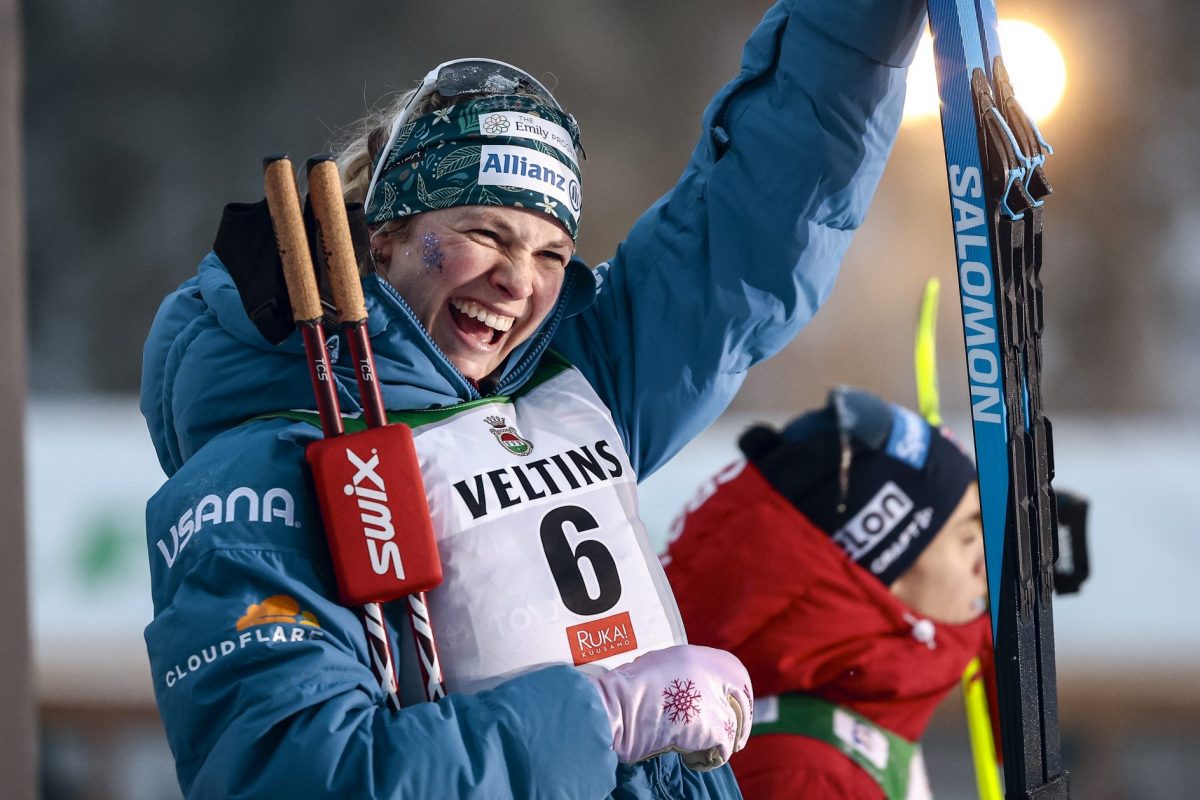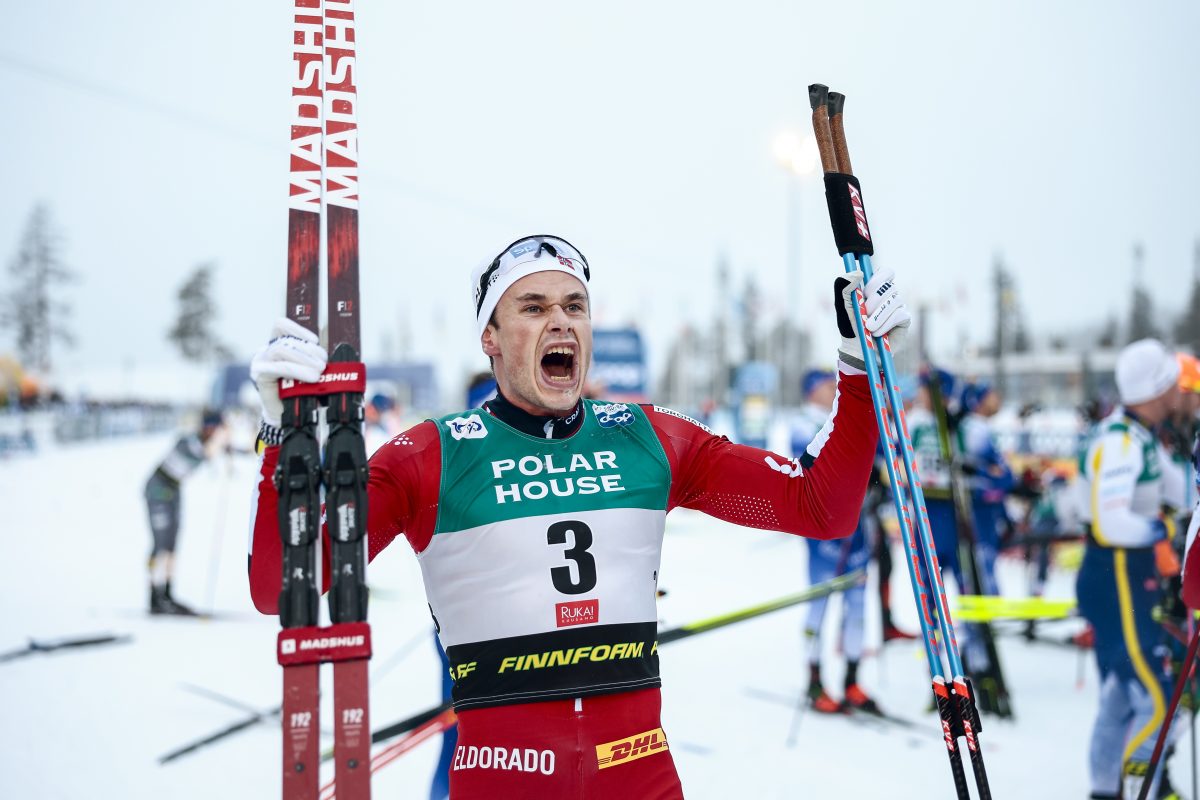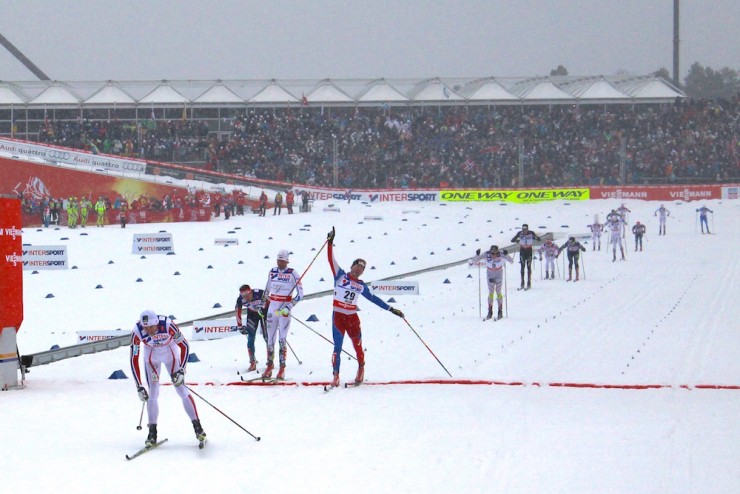
FasterSkier’s coverage of the 2015 FIS Nordic World Ski Championships in Falun, Sweden, is brought to you by the generous support of L.L. Bean, now featuring a complete line of Kikkan Randall training wear.
FALUN, Sweden — Good things comes to those who wait. If you’re Petter Northug, that good thing just happens to be a gold medal.
Northug patiently waited until the final meters of the men’s 50 k classic mass start to win his fourth gold medal of the 2015 FIS Nordic World Ski Championships. Before the last kilometer, the Norwegian hadn’t skied above 10th position and fell as far as 48th at 5 k into the race. Nevertheless, he overcame a flying Lucas Bauer and determined Johan Olsson of Sweden in the final meters to cross the line with a time of 2:26:02.1. Bauer trailed by 1.7 seconds to take the silver while Olsson finished 2.0 seconds back for third in the snowy and soft conditions.
The start of Sunday’s race began like most others in Falun – there was a light snow that fell on a roaring crowd of over 30,000, and conditions seemed to be stable. That soon changed as the snow developed into thick, wet flakes that piled on the tracks. With temperatures in the upper 30s, the course began to crumble as over 50 skiers took to the trails. By the end of the near two-and-a-half hour race, volunteers were forced to shovel meter-deep slush from multiple points on the trail.
“It was very tough. I think one of the deepest conditions that I’ve ever skied,” Bauer, a veteran World Cup skier from the Czech Republic, said after his second place finish. “It was tough for everbody, it doesn’t matter if you ask first or last.”
Despite the conditions, Northug’s three Norwegian teammates – Martin Johnsrud Sundby, Didrik Tønseth, and Niklas Dyrhaug – commanded the race from the start as a pack of over 40 skiers developed in the early kilometers. Sundby sat out the Championships’ earlier races due to illness, and the 50 k was his first race since his recovery. Behind the Norwegians were Olsson, top-ranked Dario Cologna of Switzerland, and Alex Harvey of Canada.
Throughout the first laps of the course – which consisted of subsequent blue and red 5 k laps that were combined to total five loops of 10 k – the leaders changed frequently and the large pack remained intact. At one point Harvey, fellow Canadian Ivan Babikov, American Noah Hoffman, and Great Britain’s Andrew Musgrave occupied the the top four spots as they crossed the 7.8 k mark.
While Hoffman and Musgrave would soon fall from far from the lead, their Canadian counterparts did not. After the pack completed the first 10 k loop of the day, Olsson took the lead with the aim of increasing the speed of the pack. He said after the race that the slower the pace went the worse the outcome would be for both he and his teammates.
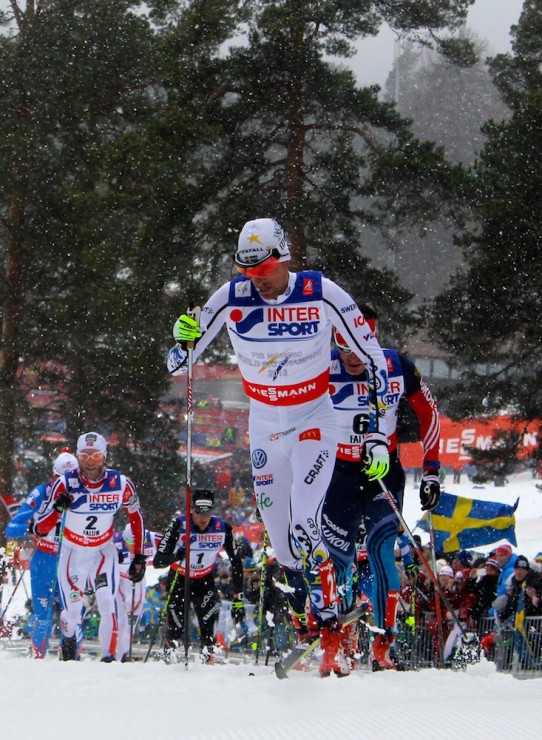
At the front, Olsson began his lead before 10 k to just after the 20 k mark. The Swede gave a famous performance in the 2013 World Championships 50 k where he broke away at 11 k to take the victory by 12.9 seconds. Olsson said he was unable to give a similar performance due to the conditions, where falling snow and a rapidly deteriorating course resulted in slow skiing regardless of the effort. Deciding to sit back and conserve energy, the 34-year-old, sat back to let Dyrhaug take the lead before 25 k.
“I had to take a little bit of rest when I realized that there was no use to make a large part of the work when I had been much in front for 25 kilometers,” Olsson said of his relinquished lead.
Dyrhaug opened up a gap, which at one point neared 10 seconds. He was then replaced by an unlikely leader – Babikov. The Canadian, who’s traditionally excelled in freestyle, skied up the hills focused on his own pace. At times he would turn around, see he was leading by several seconds, and take a break till the pack caught up.
Babikov’s lead lasted for less than 5 k as Olsson’s teammate, Anders Södergren, took charge, hoping to push the pace and spread out the leaders. At one point Soedergren led by over 18 seconds, but his lead was chipped away by Russia’s Maxim Vylegzhanin and France’s Maurice Manificat as the snow and lack of a draft hampered his progress. The two skiers caught the Swede and and eventually overcame him after 40 k.
“To go in the front, it turned me up,” Södergren said to FasterSkier about his lead. “I felt really strong with good stick on the skis. It was hard to be in the front with the snowfall. I was never tired but it was better to go back into the group.”
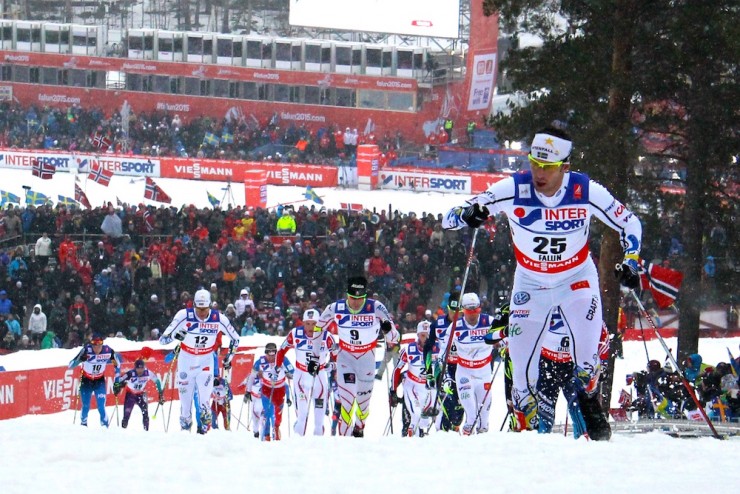
With just 5 k to go Manificat and Vylegzhanin were leading the charge through the stadium, unaware of a fateful choice made behind them. Bauer, who had been in and out of the top 10 for the majority of the race decided to take his second ski exchange before the final lap of the race. It was a risky move as the Czech skier lost precious time before entering his final 5 k.
“The first plan was [to change at] 15 then 35 but the reality was 25 and after 45 k. I think almost everyone went for exchange after 35 k and I decide in the moment that no, I would not change the skis because I had quite good skis,” Bauer said in a press conference. He explained that after 35 k he struggled to keep up with the pack because his skis were slow on the downhills. While he was able to maintain his position, he knew something had to change.
With his second ski exchange at 45 k, the 37-year-old tackled the last climbs and curving downhills with gusto, and it was soon obvious he made the right choice.
“I think it was quite big advantage for 5 k,” he said. According to Bauer, he knew that his finishing sprint wasn’t as strong as his competitors and needed an advantage in the last lap. Better skis were the solution.
Moving up through the pack, Bauer eventually reached the front to ski with Vylegzhanin in the final hills of the course before the stadium. The two were joined by Olsson who lost ground on the climbs but recovered time on the downhill into the stadium.
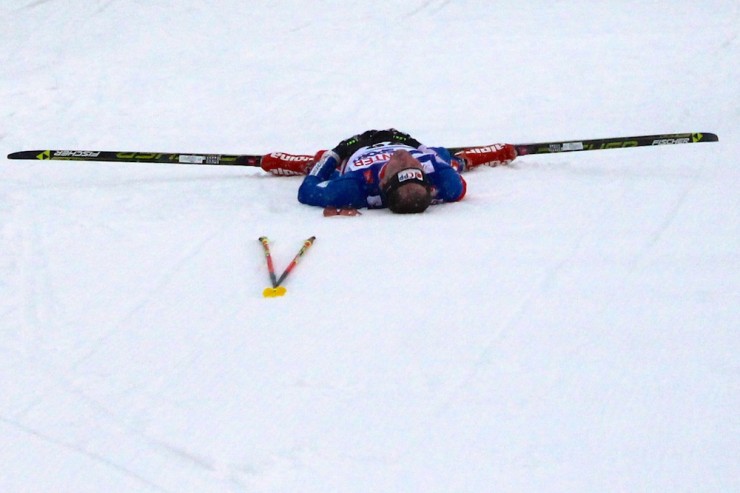
Behind them, Northug was making moves of his own. Leaving his steady 10th-place position, the Norwegian began to overcome skier by skier on the final two hills. Joined by Harvey, the two entered the stadium in fourth and fifth position.
As they began to tackle the short incline on the stadium’s short horseshoe hill Northug gave a running sprint to overcome a several second deficit and make contact with Olsson, Vylegzhanin, and Bauer.
The four entered the stadium and jostled for position. Northug stepped out of the tracks to find the faster snow between Vylegzhanin and Bauer and began to double pole with impressive intensity. Squeezing by the skiers, he inched ahead and crossed the finish line in first.
Behind him, Bauer held on to second while Olsson barely passed the Russian, whose speed deteriorated after he decided to stay in the slower tracks. Harvey, who was unable to respond to Northug, crossed the line in fifth, 6.0 seconds back.
“It is difficult for me to describe this. I’m just tired, empty of emotion and in a separate world,” Northug said after his sensational finish.
The victory was Northug’s fourth at the 2015 World Championships and his 13th overall. The gold medal is also his fourth in the 50 k, with additional wins at the 2009 and 2011 Championships and the 2010 Olympics. The number ties Swedish skier Sixten Jernberg who won two World Championship titles in 1958 and 1962 in addition to the 1956 and 1964 Olympic titles.
According to Northug, there was no particular part of Sunday’s 50 k that necessarily suited him. He explained in a press conference that his plan was to remain in the middle of the pack until the final 10 k, and then make his way towards the front.
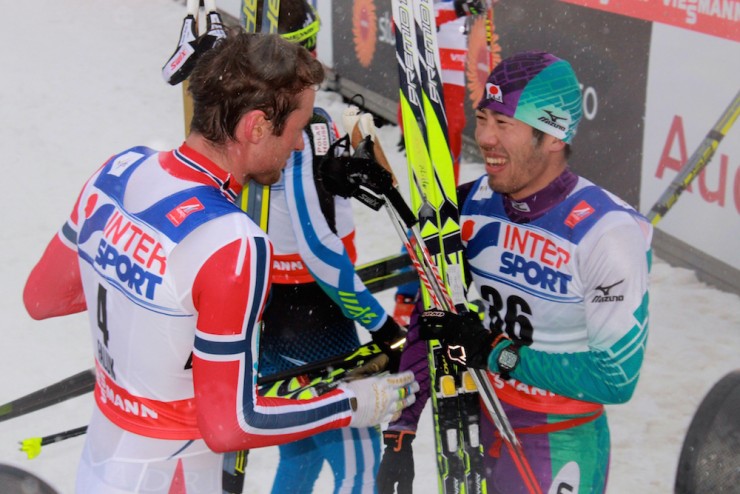
After his finish, Northug told NRK Sport that one of his favorite parts about racing is the actual finish, especially in a long 50 k.
“It is a great relief to go in the finish. The feeling of crossing the finish line first is indescribable. That is what we train for, and that is what we hope to replicate in Championships,” he said. “I have had the opportunity several times here in Falun. It is the feeling that is difficult to describe. It is so good that you do everything you can to get it back.”
Northug has faced a turbulent year after crashing a car in May and subsequently being charged with intoxicated driving. The Norwegian rarely mentions his thoughts surrounding the incident, but said to NRK that Sunday’s win was the high of two extremes in the past year. He explained that his complete focus on training in the 2015 season has been essential to his four victories in Sweden.
“There are two extremes, from being completely down to win four gold in a World Championships” he said. “The road has been long, it has been a lot of training, many tough sessions. But the plan we put in May has been solid. It has been very quality of what we have done and that is why I have been in such good shape that I’ve been in this Championship.”
Unlike Northug, the second place finisher from the Czech Republic hasn’t seen a World Championships podium in many years. Bauer’s only other time on the podium was at the Liberec Worlds in 2009 where he finished second in the 15 k classic. When asked to describe what the podium meant to him, Bauer described it with one word: satisfaction.
“It’s very nice to have again a medal in World Championships,” he siad. “I said to Johan [Olsson] that I forgot what to do in the prize giving ceremony and everything. It was a long time ago and it’s nice to return.”
Olsson, on the other hand, is no stranger to the 2015 World Championships podium. Prior to Sunday he won the 15 k freestyle and took silver in the 4 x 10 k relay. The 50 k bronze completed the medal trifecta at the World Championships. Despite his accomplishments, Olsson said he had higher expectations for the 50 k.
“Third place was not exactly what I had hoped for, but I will of course be happy about the medal. I too had a little bit of luck to clinch the bronze,” he said.
Olsson attributed much of Sweden’s success at the Championships to the national team coach, Rikard Grip. The Swedish medalist explained that Grip created an atmosphere where teammates pooled their knowledge for the betterment of each skier. He also credited the mixture of skiers on the team, saying, “there’s a mix between young, offensive thinking and some old guy that has a lot of experience” in reference to himself.
Lander Karath
Lander Karath is FasterSkier's Associate Editor from Bozeman, Montana and a Bridger Ski Foundation alumnus. Between his studies at Middlebury College in Vermont, he is an outdoor enthusiast and a political junkie.

